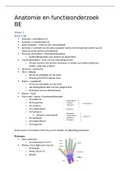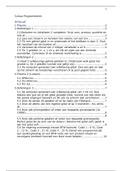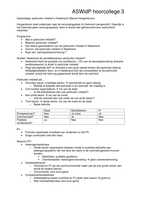Waltz (1959). Man, the State and War: A Theoretical Analysis
What gives Man, the State, and War its special status?
The chief contribution of Man, the State, and War is its clarification of a large and
frequently contradictory body of Western thought that attempted to explain the
causes of war and tell us how we might make the world more peaceful.
Waltz shows that these different theories can be grouped into three distinct categories,
which he calls “images.”
The first image emphasizes the nature of human beings while the second image
stresses the internal structure of the states that comprise the international system.
The third image focuses on the structure or architecture of that system.
Within each image, Waltz identifies striking similarities between the writings of
classical political theorists, modern social scientists, and politicians.
This insight into how to organize the field gives readers a powerful framework
for classifying competing arguments about the origins of war.
Waltz also has important things to say about the strengths and weaknesses of the arguments
contained in each image.
Most importantly, Waltz emphasizes that wars are caused by factors found within
each image, while the absence of a central political authority (anarchy), both makes
war possible and impels states to compete with one another whether they wish to
or not.
For this reason, remedies located within a particular image are doomed to fail.
Thus, Man, the State, and War doesn’t just classify the existing literature, it teaches us
how to think critically about the contents of each image and about how those
images relate to each other.
Introduction
Social scientists, realizing from their studies how firmly the present is tied to the past, are
inclined to be conservative in estimating the possibilities of achieving a better world.
If one asks whether we can now have peace where in the past there has been war, the
answers are pessimistic.
1
, Perhaps the answers will be less discouraging if instead the following questions are:
are there ways of decreasing the incidence of war?
Peace is one among a number of ends simultaneously entertained. The means by
which peace can be sought are many. The end is pursued and the means are applied
under varying conditions.
Even though one may find it hard to believe that there are ways to peace not yet tried
by statesmen, the very complexity of the problem suggests the possibility of
combining activities in different ways in the hope that some combination will lead
us closer to the goal.
Each attempt to alleviate a condition implies some idea of its causes: to explain
how peace can be achieved requires an understanding of the causes of war.
The chapters that follow are, in a sense, essays in political theory.
Why does God, if he is all-knowing and all-powerful, permit the existence of evil?
Disease, theft, murder, and war, appear as constants in world history.
Is war simply mass malevolence, and thus an explanation of malevolence is an
explanation of the evils to which men in society are prey? Many have thought so.
o For though it were granted us by divine indulgence to be exempt from all that
can be harmful to us from without [writes John Milton], yet the perverseness
of our folly is so bent, that we should never cease hammering out of our
own hearts the seeds of new misery to ourselves, till all were in a blaze again.
Our miseries are the product of our natures. The root of all evil is man, and thus he is
himself the root of the specific evil, war.
This estimate of cause has been immensely influential.
In secular terms, with men defined as beings of intermixed reason and passion in
whom passion triumphs, the belief has informed the philosophy of Spinoza.
If one’s beliefs condition his expectations and his expectations condition his acts,
acceptance or rejection of Milton’s statement becomes important in the affairs of men.
If it is true, as Dean Swift once said, that “the very same principle that influences a
bully to break the windows of a whore who has jilted him, naturally stirs up a great
prince to raise mighty armies, ” then the reasons given by princes for wars are mere
rationalizations covering a motivation they may not themselves have perceived.
2
,There are many who have agreed with Milton, but who differ on what man’s nature is, or
can become.
There are many others who quarrel with the major premise.
Does man make society in his image or does his society make him? It was to be
expected that the theologian-philosophers would attribute to human agency what
many philosophers have described as the effects of the polity itself.
Rousseau makes a break with the view that, man being a social animal, one can
explain his behaviour in society by pointing to his animal passion and his human
reason.
Man is born and in his natural condition remains neither good nor bad. It is society
that is the degrading force in men’s lives, but it is the moralizing agency as well.
Man’s behaviour is, according to Rousseau, a product of the society in which he lives.
And society is inseparable from political organization.
In the absence of an organized power, it is impossible for men to live together with
peace.
Rousseau, like Plato, believes that a bad polity makes men bad, and a good polity
makes them good.
The explanation of consequence—whether one is worried about the recurrence of war
—is to be found in studying the varying social relations of men, and this in turn
requires the study of politics.
Can man in society best be understood by studying man or by studying society?
The Reverend Thomas Malthus once wrote that, “though human institutions appear
to be the obvious causes of mischief to mankind; in reality, they are mere feathers
that float on the surface, in comparison with those deeper seated causes of impurity
that render turbid the whole stream of human life.”
Rousseau looked at the same world, the same range of events, but found the locus of
major causes in a different ambit.
Following Rousseau’s lead in turn raises questions.
o As men live in states, so states exist in a world of states. If we now confine our
attention to the question of why wars occur, shall we emphasize the role of
the state or shall we concentrate on the society of states?
3
, o Those who emphasize the first run parallel to Milton. He explains the ills of
the world by the evil in man.
o Rousseau himself finds the major causes of war neither in men nor in states
but in the state system itself. Of men in a state of nature, he had pointed out
that one man cannot begin to behave decently unless he has some assurance
that others will not be able to ruin him.
o This thought Rousseau applies to states existing in a condition of anarchy.
o Though a state may want to remain at peace, it may have to consider
undertaking a preventive war.
Statesmen have attempted to account for the behaviour of states in peace and in war.
The constant interest of the people is in peace; no government controlled by the
people will fight unless set upon. But only a few years later, England did fight against
Russia.
Taft writes: “History shows that when the people have the opportunity to speak
they as a rule decide for peace if possible. It shows that arbitrary rulers are more
inclined to favour war than are the people at any time.”
Is it true that there is a uniquely peaceful form of the state? Would it enable some
states to know which other states they could trust?
But what of those who incline to a different estimate of major causes?
“Now people,” President Eisenhower has said, “don’t want conflict—people in
general. It is only mistaken leaders that grow too belligerent and believe that
people really want to fight.”
Though apparently not all people want peace badly enough, for, on a different
occasion, he said: “If the mothers in every land could teach their children to
understand the hopes of children in every other land, the cause of peace in the world
would indeed be nobly served.”
Here the president seems to agree with Milton on where cause is to be found, but
without Milton’s pessimism (or realism).
War begins in the minds and emotions of men, as all acts do; but can minds and emotions
be changed? And how much and how fast can minds and feelings be changed? The answers
to these questions are not obvious, but they are important.
4






